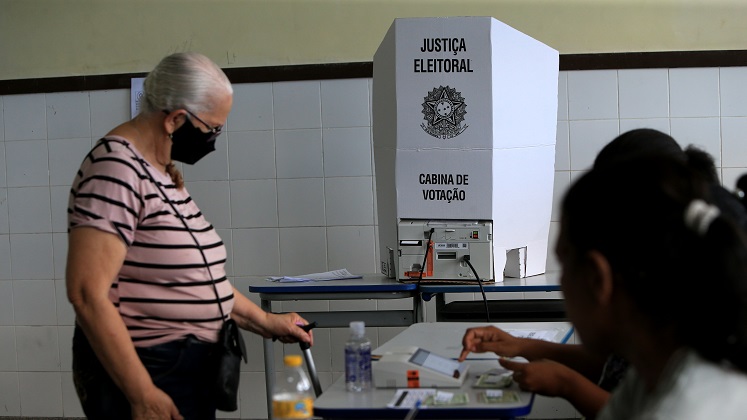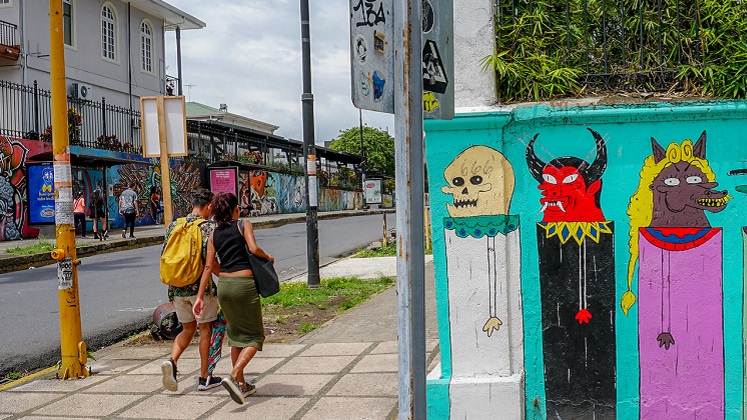One of the key issues omitted from the presidential debates has been a decentralisation crisis between levels of government. Moreover, if GDP continues to grow at the current rate, recentralisation is likely to increase regardless of the ideological leanings of the new administration, suggests Julián López Murcia (Nalanda Analytica).
Lea este artículo en español
It’s almost midday. After a half-hour flight from Bogotá and two and a half hours on the road, I arrived at a restaurant with an architectural style that surely inspired the creators of Encanto. I am here for the official launch of the Misión de descentralización, an initiative led by Colombia’s national government with experts and representatives of municipalities and departments to present reforms to the distribution of fiscal, political, and administrative prerogatives between levels of government. The last similar initiative took place almost three decades ago.
We are in the small municipality of Génova, a coffee growing and birdwatching town. Next to me is Alejandra Botero Barco, the recently appointed director of the National Planning Department (DNP). Unlike most of her predecessors, I believe she is one of the few technocrats truly open to discussing the recentralisation process in the country over the last 26 years. I was invited to this panel despite my open criticism of the role of the DNP in this process.

The most visible dimension of decentralisation is the popular election of sub-national governments. In general, affecting political decentralisation is the costliest of the possible recentralising reforms. One of the most notorious cases was the elimination of sub-national elections during Vladimir Putin’s first term in Russia. Yet, in Colombia, no government has proposed a return to the system in which the president appoints governors, and, in turn, governors appoint mayors.
However, in the last 26 years, the local governments have seen their resources – as a percentage of GDP – (Bonet, Pérez, and Ayala, 2020) and their administrative autonomy significantly diminished in favour of the national government. In other words, there have been strong fiscal and administrative recentralisation reforms.
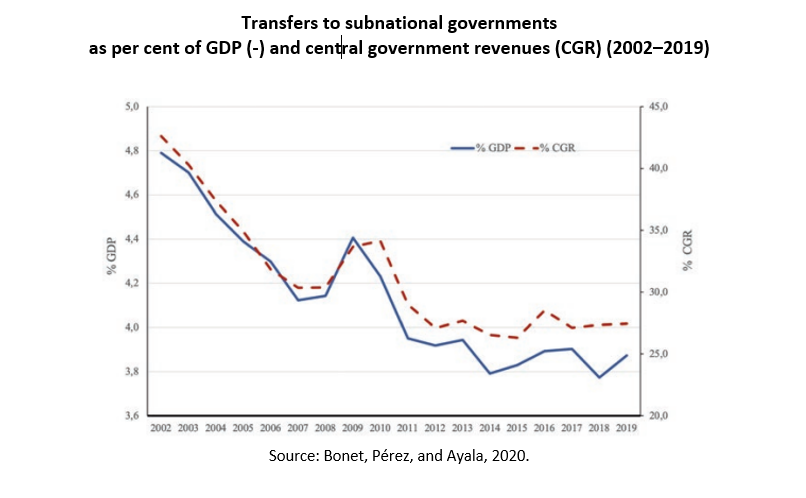
The rise of this recentralisation trend is not easy to explain. During the 1980s and 1990s, Colombia was leading a decentralisation wave. It was even considered a kind of poster child. It was expected that the country would follow a “subnational dominance path”, according to Professor Tulia Falleti.
Explaining recentralisation
How did Colombia’s national governments manage to gain political support to retake a significant part of resources, responsibilities, and authority from 32 governors and more than 1100 local mayors? They are generally self-interested politicians, democratically elected and beneficiaries of automatic fiscal transfers. Why would they give up being in charge of the most important social programmes in a highly clientelistic environment?
None of the causes of recentralisation identified in other countries of the region can fully explain the trend in Colombia. Hypothesis like a recentralisation rise because of an economic crisis developed by professors Kent Eaton and Tyler Dickovick cannot explain the reform of the revenue sharing system during the Álvaro Uribe administration (2002-2010), nor the reform of the General System of Royalties during the Juan Manuel Santos administration (2010-2018). These reforms took place during periods of economic growth.
The Colombian case cannot be explained either by hypotheses based on the existence of a strong national government. Or a left-wing administration that associates decentralisation with neoliberalism. This was not the case during the Andrés Pastrana administration, for instance.
In Recentralisation in Colombia (Palgrave Macmillan, 2022), I propose a particular explanation for the Colombian case. My research is based on almost ten years of work, which began at Oxford under the supervision of professors Christopher Hood and Eduardo Posada-Carbó. In this period, I interviewed more than a hundred people involved in these reforms, including presidents, ministers, congresspeople, governors, mayors, and officials at all territorial levels.
Colombia’s increases in the levels of recentralisation were the outcomes of the interaction between economic performance and institutional contexts. When a financial crisis (decreasing GDP) occurs, and the context is predominantly decentralised (PDI), one can expect an increase in recentralisation. If an economic boom (growing GDP) appears in the same context, one should expect the opposite. Meanwhile, if there is a crisis during a predominantly recentralised institutional context (PRI), one can expect less recentralisation. And if instead, an economic boom occurs in the same institutional context, one should expect even more recentralisation. The causal mechanisms are self-destroying and self-reinforcing dynamics regarding the predominant institutional context in an economic crisis or boom.
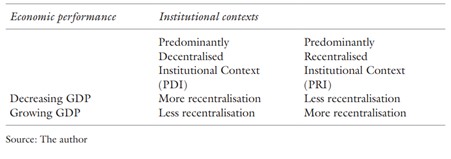
Colombians are only three months away from the end of the Iván Duque administration (2018-2022). Suppose the new government is fortunate enough to experience an economic boom either because of increases in the oil prices or any other reason. This would make us expect more recentralisation regardless of the ideology.
As argued in the book, when there is an economic boom in a predominantly recentralised institutional context, in general, the higher levels of government get most of the political benefits. They obtain more resources and have more autonomy to spend them because of the relative decrease in automatic transfers. Therefore, they win political recognition linked with their well-funded policies or projects (e.g., national social programmes). This scenario increases their bargaining power in terms of negotiating with lower levels of government. For example, they can decrease the political opposition to their recentralising reforms by offering their discretionary funds in the negotiations with legislators, governors, and local mayors. This situation may trigger further recentralising reforms (self-reinforcing dynamics).
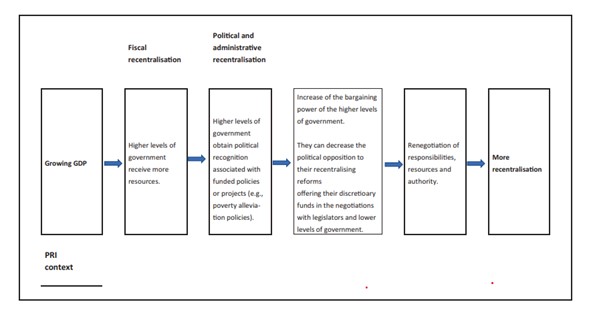
What’s next?
The four leading candidates in the polls are former mayors of Bogotá (Gustavo Petro), Medellín (Federico Gutiérrez and Sergio Fajardo) and Bucaramanga (Rodolfo Hernández). However, issues like decentralisation or recentralisation have not been crucial to this presidential campaign. And their proposals in this regard have been rather limited.
Not so long ago, Cartagena held the National Congress of Municipalities. Only Federico Gutiérrez, the right-wing candidate, addressed the mayors in person. As a former mayor himself, he focused on repeating the most common complaints about the paternalistic treatment of officials at the national level. Gustavo Petro, the left-wing candidate who is leading the polls, limited himself to sending a video with a very sparse message. Towards the end of the congress, both President Duque and the executive director of the Colombian Federation of Municipalities gave speeches. But there was no significant discussion on the administrative autonomy of municipalities or substantial changes in the distribution of resources.
Despite the launch of the Misión de descentralización, the future of municipal and departmental governments looks even more uncertain with the next presidency. This is not good news in times of populism and polarisation at the national level.
Notes:
• The views expressed here are of the author rather than the Centre or the LSE
• Please read our Comments Policy before commenting
• Banner image: Public square in Santander, Colombia / Aris Gionis (CC BY-NC 2.0)


